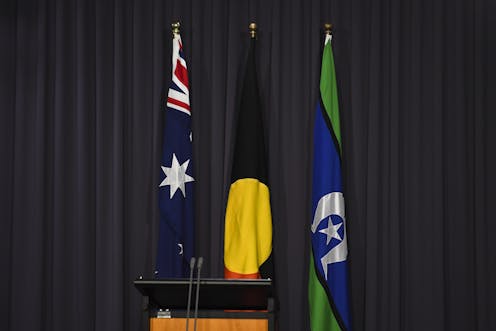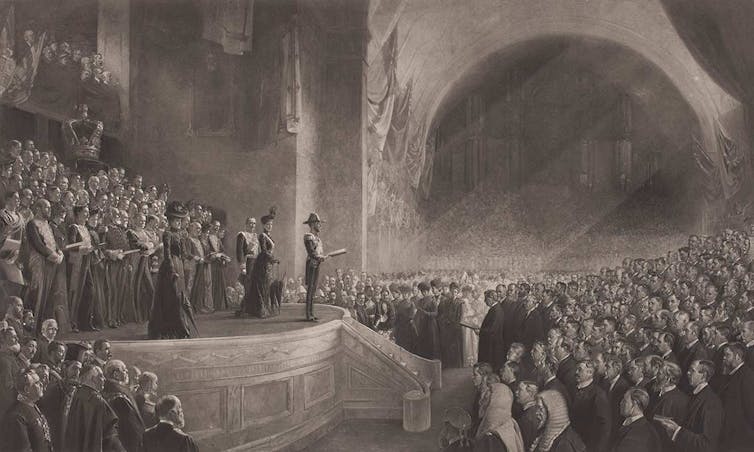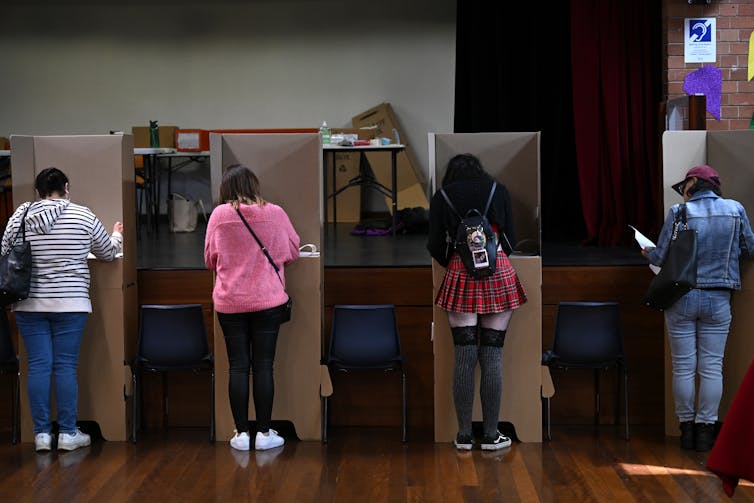Source: The Conversation (Au and NZ) – By Carolyn Holbrook, Senior Lecturer in History, Deakin University

The solicitor-general’s recent finding that former Prime Minister Scott Morrison’s furtive accrual of ministerial portfolios “fundamentally undermined” the principles of responsible government has drawn attention to the precarity of democracy. In seeking to safeguard our democracy, we must consider the extent to which Australians’ long-standing apathy about our democratic system allowed Morrison to treat it with such contempt.
Democracy is under threat around the world. Donald Trump’s autocratic populism and the attempted coup at the Capitol in January 2021 are familiar to Australians, but so-called “strongmen” have been white-anting democratic conventions in countries including the Philippines, Turkey, Hungary, Poland, Venezuela and Brazil for the past two decades.
Democratic government is a compact between the people and the state. It relies on robust institutions and an engaged and informed citizenry that holds its elected representatives to account. Complacency and ignorance provide fertile ground for populists and autocrats to spread misinformation, undermine institutions and disregard democratic conventions.
Read more:
Morrison’s multiple portfolios: why the law has nothing to do with it
Australians have recently shown enough concern to reject Morrison’s secretive and misleading government even before the ministries scandal was revealed.
Yet, worryingly, there is plenty of evidence that Australians remain both apathetic and ignorant about their democracy and its institutional guardrails.
Civics education was reintroduced in Australian schools in 1997. Yet, the most recent review of the civics curriculum indicated only 38% of Year 10 students – the level at which the compulsory civic curriculum finishes – are proficient in civics and citizenship knowledge. Young people care passionately about issues such as gender equality and climate change, yet are ill-equipped to participate in Australian democracy.
The data about civics education sit within a wider context that is highly concerning. Faith in our democracy has been plummeting since the early 21st century.
The 2019 ANU Australian Election Study found that trust in government had reached its lowest level on record, with only one in four Australians saying they had confidence in their political leaders and institutions.
The Edelman Trust barometer indicated a spike in trust in democracy in Australia during the early phases of the COVID-19 pandemic. That pattern has not been sustained. The 2022 Edelman Trust Barometer found trust in democracy among Australians had fallen six points since 2021, the second biggest decline behind Germany.
If we are to protect our democracy from bad-faith actors in the future, we need to restore faith in government and equip people with the skills to be vigilant custodians. This formidable task must begin with encouraging a sentimental attachment to Australian democracy.
Federation disappeared from view
Unlike Americans, whose precarious democracy is extravagantly mythologised, Australians are not inclined to celebrate their democratic achievement. This tendency can be traced to our national beginnings.
When the Commonwealth of Australia was created in 1901, Australians were more inclined to believe that nations were made in war rather than an act of the British parliament. Some, like the first Attorney-General Alfred Deakin, sought to establish a commemorative tradition on January 1. Deakin suggested the date be known as Commonwealth Day but found little support among his colleagues. The Federation poet George Essex Evans tried to muster pride in the fact that Australia was “Free-born of nations, Virgin white, Not won by blood nor ringed with steel”. But the sentiment of journalist and author A.G. Hales more accurately represented the view of the majority:
A nation is never a nation
Worthy of pride or place
Till the mothers have sent their firstborn
To look death on the field in the face […]
The peaceful achievement of a national democratic government at Federation simply disappeared from view.

National Museum of Australia
Anzac became our founding myth
Australians manufactured a creation myth 14 years later, during the first world war. According to the Anzac legend, Australia was born on April 25 1915 when Australian and New Zealander soldiers stormed the cliffs at Gallipoli.
The popularity of the Anzac legend declined during the 1960s and 1970s but has undergone a massive resurgence since then. Bob Hawke’s “pilgrimage” to Gallipoli with a group of elderly veterans in 1990 began the pattern of prime ministers inserting themselves at the heart of Anzac commemoration.
Since 2012, governments have channelled more than A$1 billion of taxpayer money into Anzac commemoration. This spending bonanza includes $550 million on the centenary of the first world war – more than any other nation and possibly more than all other nations combined. Governments have also spent $100 million John Monash Centre at Villers-Bretonneux in France and the controversial $500 million renovation of the Australian War Memorial.
This extraordinary outlay of money would be more wisely spent by our political leaders on sponsoring a mythology of Australian democracy.
Why we need a mythology of Australian democracy
Australia has more than enough material with which to build a democratic legend. As the political scientist Judith Brett has written, the Australian colonies and the early Commonwealth were
a laboratory for new ideas about democracy, and new methods of achieving them.
The colonies pioneered government-provided ballot papers and provided separate voting booths, which allowed people to cast their votes in secret. Women were early to get the vote, though when the Commonwealth enfranchised women in 1902 it disenfranchised Indigenous women and men.
In 1911, Saturday voting was introduced, making it easier for working people to cast their ballots. Preferential voting was introduced in 1918 and compulsory voting in 1924. Along with our non-partisan, bureaucratically managed election campaigns, compulsory voting helps Australia ameliorate the polarisation and voter suppression that are eroding American democracy.

Dean Lewins/AAP
While the Anzac legend is rooted in Australia’s Anglo-Celtic heritage, a democratic legend has the potential to appeal more widely. The latest census results confirm the cultural diversity of our population: 27.6% of us were born overseas, and 48.7% have at least one parent born overseas.
In addition to those who feel no connection to the Anzac legend, some of us come from places where democratic mores are not culturally entrenched. We need to include all Australians in the democratic project.
A concerted public education program must reckon with the failures of Australian democracy. These are most glaring in the treatment of Indigenous Australians and non-white people. The United States stands as a cautionary tale of a nation whose democratic swagger does not match reality.
Creating a sense of civic custodianship will not only protect our democratic system. It is also essential to achieving major initiatives such as an Indigenous Voice to Parliament, a republic and the federation reform that is urgently needed. Only eight of 44 referendums have succeeded since Federation, because Australians who are uncertain or disengaged simply vote “No”.
Read more:
Changing the Australian Constitution is not easy. But we need to stop thinking it’s impossible
Humans protect what they value. Australians are not inclined to learn about their democracy because they feel little attachment to it. This sentimental deficit must be filled by a concerted effort by government to enthuse Australians about our democratic system.
Imagine if the Commonwealth showed the same commitment to fanning a mythology of Australian democracy as it has to propagandising the Anzac legend. A $1 billion campaign to mythologise the democracy sausage – that could work.
![]()
Carolyn Holbrook receives funding from the Australian Research Council. She volunteered for the independent candidate for Goldstein in the May 2022 federal election.
– ref. Democracies are fragile. Australians must act urgently to safeguard ours – https://theconversation.com/democracies-are-fragile-australians-must-act-urgently-to-safeguard-ours-188580







